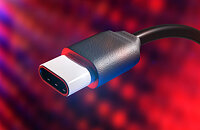Monday, August 10th 2020

Device IDs of Intel's USB 4.0 Host Controller and Strategy to Phase Out Type-A Revealed
Device IDs of Intel's upcoming line of standalone USB 4.0 host controllers leaked to the web, courtesy Hardware Leaks (@_rogame). The controller possibly comes in three variants, bearing device IDs 0x9A1B, 0x9A1D, and 0x9A13. The alleged Intel confidential document screengrab speaks of USB 4.0 and USB 3.2 support (no mention of USB 2.0/1.1), and USB Power Delivery 3.0.
With USB 4.0, the USB-IF (USB Implementers Forum, or the special interest group behind USB), appears to want to standardize the USB type-C connector, eventually phasing out the type-A connector. To that effect, the document leaves out mention of USB 2.0/1.1 backwards compatibility. USB 4.0 debuts with an interface bandwidth of 40 Gbps, or 8 times that of USB 3.0, or over 80 times that of USB 2.0.
Sources:
_rogame (Twitter), GenGoOn (image credit)
With USB 4.0, the USB-IF (USB Implementers Forum, or the special interest group behind USB), appears to want to standardize the USB type-C connector, eventually phasing out the type-A connector. To that effect, the document leaves out mention of USB 2.0/1.1 backwards compatibility. USB 4.0 debuts with an interface bandwidth of 40 Gbps, or 8 times that of USB 3.0, or over 80 times that of USB 2.0.

38 Comments on Device IDs of Intel's USB 4.0 Host Controller and Strategy to Phase Out Type-A Revealed
This article is exactly why I continue to rag on any so-called "new" or "2020" cases that do not have C-type on the front I/O, even though almost every mobo made has had at least 1 on the back plane for quite some time now...
And pleeze don't give me that nonsense about how "C connectors cost so much more than A" ..... this is B.friggin.S....
if there were more of them being used/ordered by the mfgr's, the production of the connectors, cables, and peripherals would quickly get ramped up to meet the demand, and the costs would go down very quickly... just like virtually every other piece of tech component in the past 40 years or so :clap:
And >YES< I need moar of them, since I have multiple USB-C devices that I use everyday with my 'puter...
And to clarify we are talking about RS-232. The COM port is a port.Do you mean the A ports? I would hate not having those connectors.
EDIT: Oh you mean USB 2.0. I still like to have one or two ports, I have found USB 3.0 to be a bit more sensitive. Some (old) stuff don't work with some USb 3.0 controllers.
I mean when something can be done for say $6 using a thin cable and instead you use a $25+ device + $100 cable solution you have to say you took a wrong turn somewhere.
I'm OK with USB-c (although I find it actually more fiddly to insert than the old large USB connectors I must say), but I'm not in favor of making everything USB4(+) compliant.
USB A phase out, I think will be only determined by market. USB A has more stronger port than USB C, the latter is too easy to disconnect. Not sure which port has higher wear and tear resistance, from my experience USB A has more resistance. Simply because of it's tight latching and how USB C cables are prone to kinking at the ends. USB C is expensive for these accessory makers I guess that's why no mouse uses it or a Mainstream RGB top KB like K95 use it either, and all of them use only USB 2.0 spec even DACs which are entry level use micro USB. Plus many of the phones still ship the same cables. It's robust and works. USB IF people are too stupid with their naming and standarization now it hit another peak.
Mobos still have PS/2 for those benchers and some of them allow Win7 installs too..
If it ain't broken, why fix it?
Do we really need "progress" for the sake of itself? Or is there some specific benefit those HIDs could bring using that extra bandwidth?
Problem is the chips having to dedicate a lot of bandwidth, and the solution would be 'flex USB', where the port would detect it's a USB2.0 device and then switch over to USB2 and free that excess bandwidth to other uses. Maybe put a small LED on it to indicate so, red for USB2 and blue for USB3 etcetera. (people need to be able to source issues.)
You could do that on the fly or on boot, depending on what's best for system designers.
To the manufacturers: Feel free to use that idea, I relinquish the rights for the good of the user.